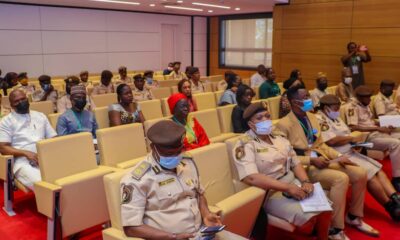Business
Ex-CBN Boss Recommends Social Market Economy
A former Deputy Gover
nor of the Central Bank of Nigeria (CBN), Dr Obadiah Mailafia has advocated the practice of a social market economy that encourages fair competition.
Mailafia made the call in Abuja at a Roundtable organised by the Korad Adenuer Stiftung (KAS), a German NGO, with the theme “Social Market Economy: A Tool for Economic and Social Development”.
According to him, such a system which creates employment, caters for citizens’ social welfare by providing amenities and security, among others, thereby advancing economic prosperity, will enable the country to exit recession.
He said every system needed sufficient competition within the framework of an open market system that prevents individual economic actors from exercising monopolistic market dominance, in order to function effectively.
He explained that within a social market economy, the key responsibilities of government should centre on maintaining a regulatory environment that promotes fair competition and a level playing field for economic actors.
Mailafia, therefore, urged the government to discourage a market system that does not encourage competition and allow an open market for potential suppliers to enter so as to expand competition in the economy.
“Over the years, the economy of Nigeria has been controlled by a particular group of people which has led to the imprisonment of the economy.
“This has caused Nigerian consumers to be shortchanged for poor quality products at higher prices.
“What is advocated is not for government to set up companies but rather, invest in building a sound business environment and incentive-system that drives innovation.’’
Mailafia advised the government to learn from the social market economy model of Germany, noting that it has been a critical factor to Germany’s prosperity for more than half a century.
According to him, Nigeria and Germany share a lot of similarities as populous nations, regional powers in their respective regions, adding: “If it can work in Germany, it should work in Nigeria.”
Business
Kenyan Runners Dominate Berlin Marathons
Kenya made it a clean sweep at the Berlin Marathon with Sabastian Sawe winning the men’s race and Rosemary Wanjiru triumphing in the women’s.
Sawe finished in two hours, two minutes and 16 seconds to make it three wins in his first three marathons.
The 30-year-old, who was victorious at this year’s London Marathon, set a sizzling pace as he left the field behind and ran much of the race surrounded only by his pacesetters.
Japan’s Akasaki Akira came second after a powerful latter half of the race, finishing almost four minutes behind Sawe, while Ethiopia’s Chimdessa Debele followed in third.
“I did my best and I am happy for this performance,” said Sawe.
“I am so happy for this year. I felt well but you cannot change the weather. Next year will be better.”
Sawe had Kelvin Kiptum’s 2023 world record of 2:00:35 in his sights when he reached halfway in 1:00:12, but faded towards the end.
In the women’s race, Wanjiru sped away from the lead pack after 25 kilometers before finishing in 2:21:05.
Ethiopia’s Dera Dida followed three seconds behind Wanjiru, with Azmera Gebru, also of Ethiopia, coming third in 2:21:29.
Wanjiru’s time was 12 minutes slower than compatriot Ruth Chepng’etich’s world record of 2:09:56, which she set in Chicago in 2024.
Business
NIS Ends Decentralised Passport Production After 62 Years
Business
FG To Roll Out Digital Public Infrastructure, Data Exchange, Next Year
-

 Politics5 days ago
Politics5 days agoRivers Assembly Resumes Sitting After Six-Month Suspension
-
Sports5 days ago
RSG Pledges To Develop Baseball
-

 Featured5 days ago
Featured5 days agoPANDEF Hails Tinubu For Lifting Emergency Rule In Rivers
-
News5 days ago
KenPoly Governing Council Decries Inadequate Power Supply, Poor Infrastructure On Campus
-

 News5 days ago
News5 days agoFubara’s Return: Rivers Elders, Women Call For Unity, Hail Tinubu
-

 News5 days ago
News5 days agoFAAC Disburses N2.225trn For August, Highest In Nigeria
-

 News5 days ago
News5 days agoFG Ends Passport Production At Multiple Centres After 62 Years
-
Rivers5 days ago
RIVCHPP Mulls Plan For Universal Health Coverage In Rivers

